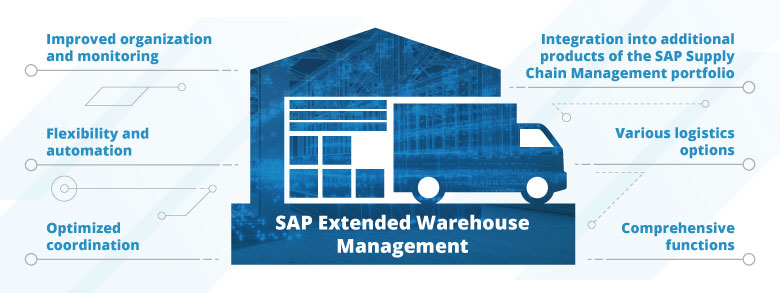SAP EWM: Introduction, migration & features
SAP Extended Warehouse Management for modern, scalable and future-proof intralogistics processes
SAP EWM (Extended Warehouse Management) is the strategic warehouse solution from SAP under SAP S/4HANA and helps companies implement efficient optimization of their warehouse logistics processes. Integration in other SAP modules such as SAP S/4HANA or SAP ERP allows logical processes to be seamlessly mapped and automated. This enables managed warehousing with impressive features such as precision control and real-time transparency. Compared to its predecessor, SAP WM (Warehouse Management), the solution offers a far greater set of functions with many new features.
Migrating is worthwhile, not least since after the year 2025, SAP WM will lose its usage rights under S/4HANA. After this time, only the basic functions of this proven solution will be usable in the basic solution for warehouse management – SAP Stock Room Management – integrated in SAP S/4HANA. Below you will learn which new features the solution offers and why an introduction to SAP EWM is beneficial for your company.
SAP EWM introduction: When is it worth it switching from SAP WM to SAP EWM?
By introducing SAP EWM in your company, you will benefit from a far more versatile range of functions that make it unnecessary to develop a multitude of customized additions that are necessary when using SAP WM. Furthermore, the solution provides comprehensive process support for all types of warehouses as a response to increased process requirements. As such, SAP EWM is the perfect choice for companies that wish to introduce SAP S/4HANA and desire a high degree of functionality for their warehouse management.
Deployment options for SAP EWM
SAP EWM (Extended Warehouse Management) offers flexible deployment options that can be tailored to a company's requirements and IT strategy. It can be integrated directly into an SAP S/4HANA system as embedded EWM or operated as a decentralized EWM solution on a separate system, allowing it to be combined with an existing SAP ERP system – either on-premise or in the cloud. As part of RISE with SAP , it can also be operated as an embedded EWM in a private cloud. This means companies can benefit from standardized cloud services while maintaining a high level of process control and system integration.
The features of SAP Extended Warehouse Management
Migrating to SAP EWM is mainly worthwhile regarding the many features and the accompanying optimization of processes in your warehouse. You can take advantage of the following practical functions:

- Intelligent modeling of your warehouse structure
SAP EWM enables in-depth and flexible mapping of the physical warehouse structure, including warehouse complexes, storage areas, storage locations and workstations. This structure is the basis for process control in the warehouse and enables precise allocation of goods movements and tasks.
- Smart goods receipt and goods issue processes
SAP EWM supports all steps in goods receipt – from delivery processing and quality inspection to putaway and optional cross-docking. Efficient handling of processes such as picking, packing, loading and shipping is also possible, and can be system-supported with SAP EWM in goods issue.
- Transparent inventory management at storage location level
Unlike conventional SAP MM inventory management, SAP EWM offers finely granulated inventory management at individual storage location level. This makes it possible to access precise information on quantities, storage locations, batches or serial numbers at any time.
- Integrated RF framework & mobile data capture
The RF framework provides mobile user interfaces that are optimized for hand-held scanners, forklift terminals or tablets. This enables direct control and documentation of warehouse processes such as goods receipt, order picking and inventory at the point of action – quickly and with fewer errors.
- Targeted, efficient resource management
Resource management enables targeted planning and control of warehouse resources such as employees or industrial trucks. The system supports the allocation of tasks based on qualifications, availability and location, to ensure optimum capacity utilization.
- Precision batch and serial number management
For products that are subject to traceability, SAP EWM supports the seamless management of batch and serial numbers. This makes it possible to satisfy legal requirements and implement recall campaigns efficiently.
- Flexible Value-Added Services (VAS)
SAP EWM enables the integration of additional work steps in the warehouse, such as product packaging, labeling, adding advertising material and simple assembly tasks. These steps can be planned, documented and invoiced as part of warehouse processes.
- Dynamic cross-docking
Cross-docking functions make goods available for dispatch immediately after receipt, without the need for temporary storage in a warehouse. SAP EWM automatically recognizes such processes based on master data or planning information and executes them efficiently.
- Conveyor technology and material flow system (MFS) integration
SAP EWM can be integrated directly with automated warehouse and conveyor systems. Signals are exchanged between SAP and controllers (e.g. PLC) in real time via MFS (material flow system) to ensure efficient control of transport orders.
- Integration with other products from the SAP SCM portfolio
The comprehensive optimization of your logistics processes is further supported by integrating SAP EWM alongside other products from the SAP Supply Chain Management (SCM) portfolio, such as SAP TM (Transportation Management), or SAP Yard Logistics.
How introducing SAP EWM benefits you
All the processes in your warehouse can be managed and optimized with SAP Extended Warehouse Management, which results in various advantages that benefit both your company and your employees:
Future-proof solution
Unlike SAP WM, which will expire in the coming years, or the base solution for fundamental warehouse processes under S/4HANA, SAP Stock Room Management, SAP EWM provides you with a future-proof solution for your warehouse management. As a result, you will avoid another migration in the coming years, which would be required due to the increasing process requirements. By introducing SAP EWM, you can already identify and take advantage of new capabilities on the process end.
Various scaling options
Growth is one of the most important goals of any company. Because of this, the SAP EWM system can be flexibly scaled and adapted to the respective size of your warehouse.
How the migration takes place with ORBIS as a reliable partner
Thanks to our experts’ profound expertise in SAP logistics processes developed over many years and our ability to integrate customized add-ons and specialized SAP-applications, we work with you to implement your own specific requirements – flexibly, for the long term and tailored exactly to your process landscape.
There are generally many different migration scenarios for introducing SAP EWM under SAP S/4HANA. On the other hand, the best scenario for your company depends on various aspects. You must take into account whether and which existing SAP solution is currently being used for warehouse management and whether integrated or decentralized operation is desired. ORBIS assists you in all these aspects with expert consulting. Together, we will find the ideal solution for you and develop the appropriate, customized roadmap alongside you.
Ever since the release of SAP S/4HANA 1909, SAP Stock Room Management has been covered by the license for SAP S/4HANA Enterprise Management. This solution is designed to allow SAP customers to continue using the SAP WM basic functions after 2027.




















